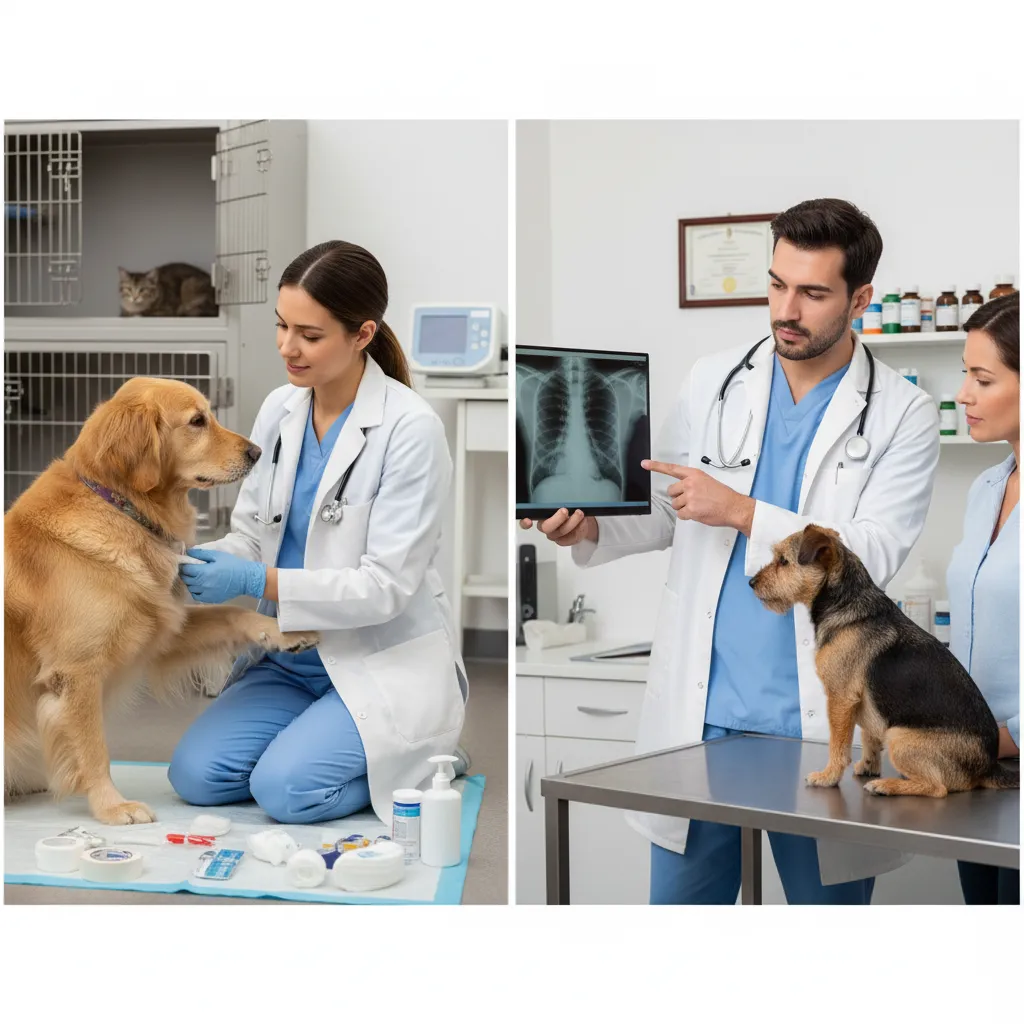Veterinary Technician vs Veterinarian: Which Career Is Right for You?
Choosing a career in animal healthcare can be both exciting and overwhelming. Many people who love animals consider becoming either a veterinary technician or a veterinarian. While these two professions share a passion for animal care, they differ significantly in education, responsibilities, salary, and career opportunities. Understanding the distinctions between these careers is essential before you commit to one path.

This comprehensive guide will compare the roles of veterinary technicians vs veterinarians, highlighting their education requirements, daily responsibilities, work environments, salaries, and long-term career outlooks. By the end, you will have a clear picture of which profession best aligns with your skills, goals, and lifestyle.
Understanding the Veterinary Field
The veterinary industry covers a broad spectrum of animal healthcare services, ranging from preventive care and surgery to diagnostics and emergency medicine. Both veterinarians and veterinary technicians play crucial roles in ensuring animals remain healthy, but their scope of practice is not the same.
Veterinary medicine is highly rewarding for those passionate about animals, but it also requires dedication, strong communication skills, and the ability to handle emotional challenges, especially when dealing with sick or injured pets.
What is a Veterinary Technician?
A veterinary technician, often referred to as a "vet tech," is a trained professional who assists veterinarians in clinical settings. Their role is comparable to that of a nurse in human medicine. Vet techs perform essential tasks that allow veterinarians to focus on diagnosis and treatment.
Common responsibilities include:
- Performing laboratory tests such as bloodwork and urinalysis.
- Assisting in surgeries by preparing equipment and monitoring anesthesia.
- Taking X-rays and handling diagnostic imaging.
- Administering medications and vaccinations.
- Educating pet owners on proper animal care.
Vet techs are often the bridge between veterinarians and clients, ensuring that pet owners understand treatment plans and aftercare instructions.
What is a Veterinarian?
A veterinarian, sometimes called a "vet," is a licensed doctor of veterinary medicine (DVM or VMD). Veterinarians are responsible for diagnosing illnesses, performing surgeries, prescribing medications, and developing treatment plans for animals.
Their role includes:
- Conducting physical exams.
- Performing surgical procedures ranging from spaying/neutering to orthopedic surgeries.
- Prescribing medications and specialized diets.
- Making critical decisions in emergency situations.
- Leading veterinary teams and managing clinics.
In essence, veterinarians act as the primary decision-makers in animal healthcare, while vet techs support and assist in implementing their plans.
Education and Training Requirements
Veterinary Technician Education
To become a veterinary technician, students must typically earn a two-year associate degree from an accredited veterinary technology program. Some choose to pursue a bachelor’s degree in veterinary technology for greater career opportunities. After completing their studies, vet techs must pass the Veterinary Technician National Exam (VTNE) to become licensed.
Veterinarian Education
A veterinarian requires far more extensive education. After earning a bachelor’s degree in a science-related field, aspiring vets must complete a Doctor of Veterinary Medicine (DVM) program, which typically takes four years. Admission into vet school is highly competitive and requires strong academic performance in courses such as biology, chemistry, and anatomy.
Key Difference
While a vet tech can begin working in as little as two years, a veterinarian typically spends seven to nine years in higher education.
Roles and Responsibilities
Veterinary Technician Duties
Vet techs are hands-on with animals daily. They provide technical support by:
- Collecting samples for testing.
- Monitoring anesthesia during surgery.
- Handling dental cleanings.
- Recording patient medical histories.
Veterinarian Duties
Veterinarians hold ultimate responsibility for patient outcomes. They:
- Diagnose illnesses and injuries.
- Prescribe treatments and medications.
- Perform surgeries.
- Provide specialized care, such as oncology or cardiology.
Example: A vet tech may draw blood and run diagnostic tests, but only a veterinarian can interpret those results and prescribe treatment.
Work Environment and Lifestyle
Veterinary Technicians
Vet techs usually work in veterinary clinics, animal hospitals, research facilities, or zoos. Their work is physically demanding, requiring frequent lifting, restraining animals, and long hours on their feet.
Veterinarians
Veterinarians can work in similar settings but often take on leadership roles. Some own private practices, while others work in government agencies, research institutions, or even wildlife conservation.
Example: A vet tech might work primarily with companion animals in a local clinic, while a veterinarian could specialize in equine medicine or exotic animals.
Salary Comparison
Veterinary Technician Salary
According to the U.S. Bureau of Labor Statistics, the median annual salary for veterinary technicians is around $38,000 to $45,000. While this may seem modest, it is achievable with just a two-year degree.
Veterinarian Salary
In contrast, veterinarians earn significantly more. The average annual salary for veterinarians ranges from $100,000 to $130,000, depending on specialization and location. Specialists, such as veterinary surgeons or oncologists, may earn even higher salaries.
Key Difference
The salary gap is substantial, but so is the difference in educational investment.
Career Growth and Opportunities
Veterinary Technician Career Path
Vet techs can advance into specialized fields such as anesthesia, emergency care, dentistry, or zoological medicine. With experience, some move into management or teaching roles.
Veterinarian Career Path
Veterinarians have broader opportunities for growth. They can specialize in surgery, dermatology, cardiology, or public health. Many also open private practices or pursue research and academia.
Example: A vet tech might become a supervisor in an animal hospital, while a veterinarian could transition into a leadership role at a university or government agency.
Emotional and Physical Demands
Both careers come with emotional challenges. Working with sick or injured animals can be stressful, and handling euthanasia is often the most difficult aspect of the job.
- Veterinary Technicians: Frequently handle the physical labor of restraining animals, cleaning equipment, and assisting with emergencies.
- Veterinarians: Face the emotional burden of making life-or-death decisions and delivering difficult news to pet owners.
Pros and Cons of Each Career
Veterinary Technician Pros:
- Shorter education timeline.
- Lower tuition costs.
- Hands-on animal care daily.
Veterinary Technician Cons:
- Lower salary.
- Physically demanding.
- Limited decision-making authority.
Veterinarian Pros:
- Higher salary and prestige.
- Wide range of career opportunities.
- Ability to specialize in advanced fields.
Veterinarian Cons:
- Long and expensive education.
- High student debt.
- Stressful responsibilities.
Which Career is Right for You?
When deciding between veterinary technician vs veterinarian, ask yourself these key questions:
- Do you want to diagnose and prescribe treatments, or do you prefer hands-on patient care?
- How much time and money are you willing to invest in education?
- Are you comfortable with high responsibility and decision-making pressure?
- Is a higher salary and potential for specialization important to you?
Example: If you want to enter the workforce quickly and work closely with animals every day, becoming a vet tech may be ideal. If you’re passionate about leadership, diagnosis, and specialized care, becoming a veterinarian may be the better path.
Conclusion
Both veterinary technicians and veterinarians are essential to the field of animal healthcare. While vet techs provide critical support and hands-on care, veterinarians act as decision-makers and leaders in the medical process.
Ultimately, the right career depends on your personal goals, financial situation, and lifestyle preferences. If you want to join the workforce sooner and enjoy direct interaction with animals, becoming a vet tech could be fulfilling. If you’re prepared for a long educational journey and seek higher responsibility and income, becoming a veterinarian might be the career of your dreams.
Whichever path you choose, a career in veterinary medicine ensures you will make a lasting difference in the lives of animals and their owners.











